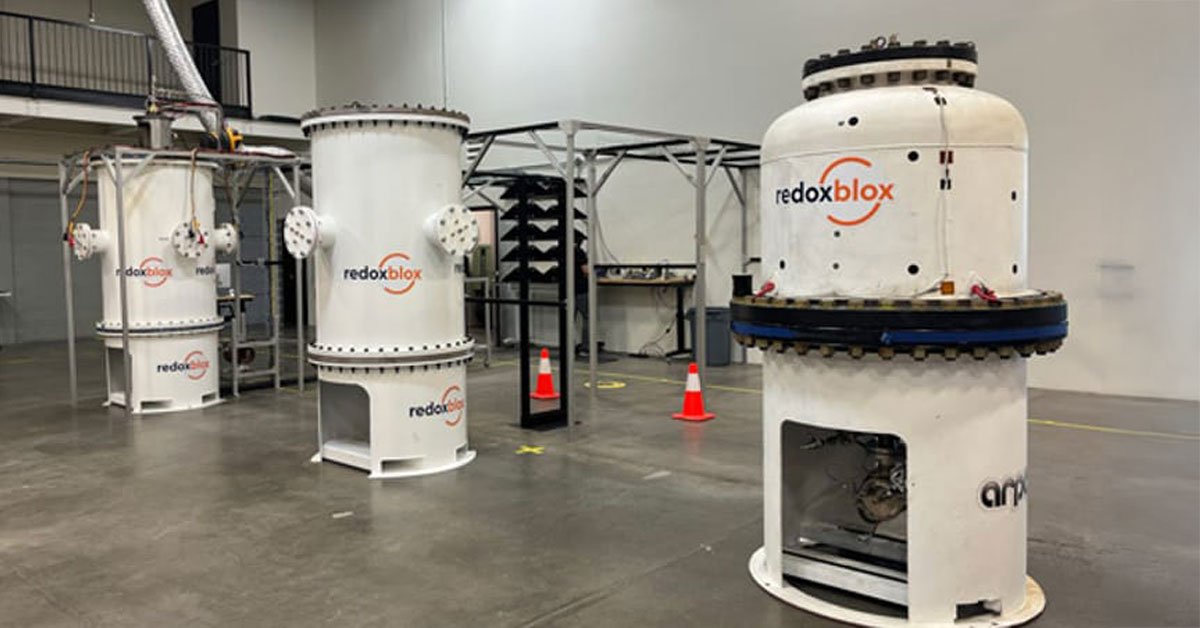Redoxblox Raises $40.7M to Support Clean Energy Storage for Industrial and Grid Applications
MSU Research Foundation portfolio company is commercializing thermochemical energy storage technology developed at Michigan State University
EAST LANSING, Mich. (Oct. 31, 2024) — MSU Research Foundation portfolio company Redoxblox has closed a $40.7 million round of Series A funding round, led by Prelude Ventures. The MSU Research Foundation participated in the round through its captive venture funds, Red Cedar Ventures and Michigan Rise Pre-Seed Fund III, alongside Prelude Ventures, Imperative Ventures, New System Ventures, and existing investors Breakthrough Energy Ventures and Khosla Ventures.
Redoxblox uses a chemically reactive metal oxide to pack more energy into its thermochemical storage systems aimed at industrial decarbonization. (Redoxblox)
Redoxblox was founded in 2020 by Michigan State University professors James Klausner and Jörg Petrasch. Klausner initially discovered the materials in 2018 while at the University of Florida, later bringing his team to MSU to continue the development. The MSU Research Foundation was an early investor in Redoxblox.
Redoxblox is pioneering a new class of low-cost thermochemical energy storage systems (TCES) designed to accelerate industrial decarbonization and address long duration energy storage needs for the grid. The company’s TCES units store energy both chemically and as heat at high temperatures, allowing for continuous or on-demand discharge for industrial processes or electricity generation. The system can fast charge when electricity prices are low or during periods of surplus renewables generation.
Today, 95 percent of industrial heat is provided by fossil fuels, which accounts for 30 percent of global carbon emissions. Decarbonizing this sector has been historically challenging due to a lack of affordable emissions-free alternatives. With a conversion efficiency comparable to lithium-ion batteries, higher energy density, and direct high temperature air discharge, Redoxblox provides the first reliable, cost-competitive solution to effectively use electricity as an alternative to fossil fuels. The system also offers space efficient, grid-scale long duration energy storage, enabling intermittent renewables to meet baseload needs.
New CEO
The company also announces the appointment of a new CEO, Pasquale Romano, formerly President and CEO of ChargePoint and currently Member of The President of the United States’ National Infrastructure Advisory Council (NIAC). Romano will lead the company through its next phase of growth, expanding into key industrial heat and long duration grid scale storage markets.
“Decarbonization depends on widespread adoption of cost-competitive alternatives to fossil fuels for industrial heat applications that address the time-varying nature of electricity demand and fluctuating renewable generation. Our goal is to address the density, cycle life, reliability, efficiency, and cost requirements to enable the world to decarbonize without economic compromise,” said Romano. “Decarbonization has to be a natural side effect of utilizing cost-competitive technologies to meet the world's energy needs.”
The company’s Series A funding follows grants from the California Energy Commission (CEC) and the U.S. Department of Energy (DOE). Redoxblox was selected by the CEC for a project to demonstrate the ability to provide 24 hours of electricity storage capacity in collaboration with UC San Diego and the Electric Power Research Institute (EPRI). Similarly, the DOE’s Industrial Efficiency and Decarbonization Office chose Redoxblox for an industrial-scale thermochemical energy storage project, partnering with Dow Chemical and EPRI to decarbonize steam production at Dow’s West Virginia plant. Both initiatives represent significant strides toward decarbonizing industrial heat and grid storage at scale.
Redoxblox’s storage modules are built with stable, long-lasting, non-toxic, non-flammable, and recyclable materials that can operate at temperatures up to 1500°C. After extensive cycle testing, the material proved capable of supporting mission critical industrial applications and as a reliable energy store for the grid. A single unit can store up to 20 MWh of energy at 95 percent round trip efficiency.
“Redoxblox is on an exciting track and have created a compelling value proposition,” said Jeff Wesley, Executive Director of Ventures for the MSU Research Foundation. “We're excited to see them bring their solutions to market."
###
About Redoxblox
Located in San Diego, Redoxblox is pioneering a new class of low-cost thermochemical energy storage systems (TCES) designed to accelerate industrial decarbonization and address long duration energy storage needs for the grid. The company’s TCES units store energy both chemically and as heat at very high temperatures that can be discharged continuously or as needed directly into industrial processes or as an energy source for electricity generation. The system can be fast charged when electricity prices are low or during surplus renewables generation and discharged as needed. Redoxblox is backed by Prelude Ventures, Khosla Ventures, Breakthrough Energy Ventures, Imperative Ventures, and New System Ventures. To learn more, visit the website or follow Redoxblox on LinkedIn.
About MSU Research Foundation
The MSU Research Foundation supports the Michigan State University ecosystem with resources that increase the impact of research and innovation. The Foundation achieves its mission through grant programs that contribute over $15 million annually to the University, entrepreneurial programming and early-stage investments that accelerate technology transfer and startup growth throughout Michigan, and environments where startup businesses and collaborators can thrive. The Foundation's work is made possible through its stewardship of a flexible and sustainable endowment, nourished by over 50 years of licensing revenues and investment returns. Learn more about the MSU Research Foundation and its impact at msufoundation.org

